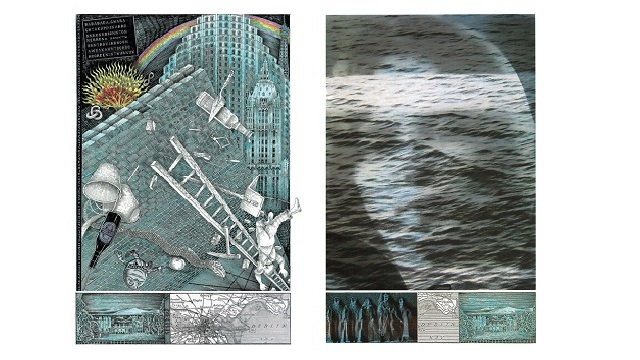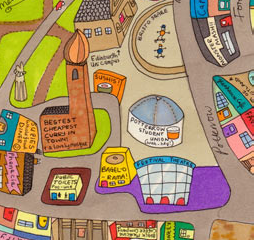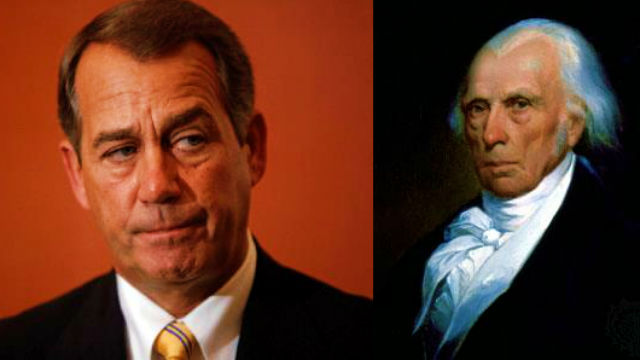We’ve only ever seen 2nd-generation stars and later. Until, just maybe, now. “For my part I know nothing with any certainty, but the sight of the stars makes me dream.” […]
Search Results
You searched for: John James
The Barnes Foundation’s current exhibition, Mark Dion, Judy Pfaff, Fred Wilson: The Order of Things, epitomizes the business buzz phrase “disruptive innovation” like few other museum shows (which I wrote about here). Disrupt or die, the thinking goes. Old orders must make way for new. Coincidentally, as the Barnes Foundation, home of Dr. Albert Barnes’ meticulously and idiosyncratically ordered collection of Impressionist and Post-Impressionist masterpieces left just so since his death in 1951, invites outsider artists to question and challenge Dr. Barnes’ old order, it also publishes their own insider’s critical “warts and all” assessment of Dr. Barnes’ relationship to African art and African-Americans. In African Art in the Barnes Foundation: The Triumph of L’Art nègre and the Harlem Renaissance, scholar Christa Clarke reassesses Dr. Barnes intentions and results in his building of the first great African art collection in America. “More than just formal accents to modernist paintings and other Western art in the collection,” Clarke argues, “African art deserves to be seen as central to the aesthetic mission and progressive vision that was at the very heart of the Barnes Foundation.”
NASA represents a full 50% of the world’s expenditures on space science & exploration. What should we expect from it? “This Administration has never really faced up to where we […]
“They f**k you up, your mum and dad,” poet Philip Larkin wrote in the late work “This Be the Verse.” “They may not mean to, but they do./ They fill you with the faults they had/ And add some extra, just for you.” Larkin kidded that those lines would be his best remembered, a guess not too far off 30 years after his death. Where others see in those lines a perfect portrait of the sour, sad curmudgeon poet, in the new biography Philip Larkin: Life, Art and Love, James Booth sees something different. “The poem’s sentiment is sad, but the poem is full of jouissance,” Booth argues. “This must bid fair to be the funniest serious English poem of the 20th century.” Likewise, Larkin — target of posthumous charges of racism, misogyny, and assorted cruelties — could lay claim to being the “funniest serious” English poet of the 20th century. Booth, who knew and worked with Larkin, shows the sweet, happy side of the sour, sad poet and makes a strong case for learning to love Larkin again, if not for the first time.
On February 8, 1915, at Clune’s Auditorium in Los Angeles, California, D. W. Griffith’s Birth of a Nation premiered. The fledgling art form of film would never be the same, especially in America, which even half a century after the end of the Civil War struggled to come to terms with race. Now, a century after Birth of a Nation’s premier, America still struggles not only with race, but also with how race plays out on the silver screen. For good and ill, Birth of a Nation marks the beginning of the first 100 years of the American Cinema—epically beautiful, yet often racially ugly.
Some health advocates believe the public would eat healthier if they were informed just how much they’d have to exercise to work off a bowl of sugary cereal or a liter of cola.
“riverrun, past Eve and Adam’s, from swerve of shore to bend of bay,” begins James Joyce’s Finnegans Wake, opening a torrent of words that has drowned many readers in confusion […]
How to figure out your location on Earth with only the most primitive tools. “And you may find yourself in another part of the world.And you may find yourself behind […]
The Motus Pitcher sleeve, worn from the elbow to the forearm, generates data to determine if he is at risk of injury or fatigue. The Smart Sleeve is one of many major advancements in biomechanics aimed at curbing sports injuries.
More science, more stories, and more spectacular scientists are coming to Starts With A Bang! Image credit: BBC, The Story of Science. “Men at some time are masters of their […]
Edinburgh is the “grey metropolis in the North.” It has been for centuries, and thanks to Unesco, the capital of Scotland will keep its dour exterior for the foreseeable future. […]
With a planetary nebula, over 80,000 stars and a distance of only 10,000 light-years, it’s one of the most rewarding globulars of all! Image credit: R. Columbari, via http://asterisk.apod.com/viewtopic.php?t=31833. “I […]
What the first signs of life beyond our Solar System will look like. Image credit: Tanga et al., 2012. “Language… has created the word ‘loneliness’ to express the pain of […]
A forgotten almost-hero of the 19th century still has something to teach about science… and style. “There is nothing more contemptible than a bald man who pretends to have hair.” –Martial […]
The flood of images of violence and unrest continues to flow from Ferguson, Missouri, in the wake of the shooting death of Michael Brown on August 9, 2014. (See one […]
Supermoons are both super and common, but they’re only a tiny slice of our nearest neighbor’s magnificent journey. Image credit: ESA / NASA and the International Space Station. “O, swear […]
How do we know how old the most distant objects we see actually are? “Sometimes a person has to go a very long distance out of his way to come back […]
Every prediction it’s ever made has been verified, except for one. “These neutrino observations are so exciting and significant that I think we’re about to see the birth of an entirely […]
There’s a supermassive black hole at the center of almost all of them, but who came first? “One has to be an optimist; one has to hope that somewhere there’ll be […]
General relativity sure does make some counterintuitive predictions. “They say the universe is expanding. That should help with the traffic.”–Steven Wright Each week on Ask Ethan, I take a dive […]
How the most powerful telescope ever built will owe its successes and discoveries to scientists who’ll never get the glory. “The soul without imagination is what an observatory would be without […]
Summer is coming, and with it, the most famous nebula in the night sky. “The self-same atoms which, chaotically dispersed, made the nebula, now, jammed and temporarily caught in peculiar positions, […]
This April 15th, Earth experiences a total lunar eclipse, followed by an annular solar eclipse just 14 days later. “And everything under the sun is in tuneBut the sun is eclipsed […]
Your first philosophers: Marcus Aurelius, Epictetus, Seneca, and one strange new face. Why the first books people read about Stoicism should be by one of these guys. On Stoicism Graduation season […]
Why are today’s paparazzi so terrible? The combative relationship between photojournalists and their celebrity subjects seems to have become an all-out war as photographers look to capture content not already […]
To the limits of our observable Universe and well beyond, here’s what we know the minimum size of the Universe must be, along with how we know it. “The greatest enemy […]
We Earthlings have lots of growing up to do before we reach the shimmering standard of equality set by Starfleet and the United Federation of Planets.
The Standard Model can’t be all there is. Here are five compelling reasons why. “Other than the laws of physics, rules have never really worked out for me.” –Craig Ferguson Two […]
James Madison’s analysis of the American republic is often praised for its brilliance, but the 4th president could not have envisioned the chutzpah and anti-government zeal of the 2013 House Republicans.
Fewer than 14% of American silent films still exist today in complete form according to “The Survival of American Silent Feature Films: 1912-1929,” a recent Library of Congress report by […]












